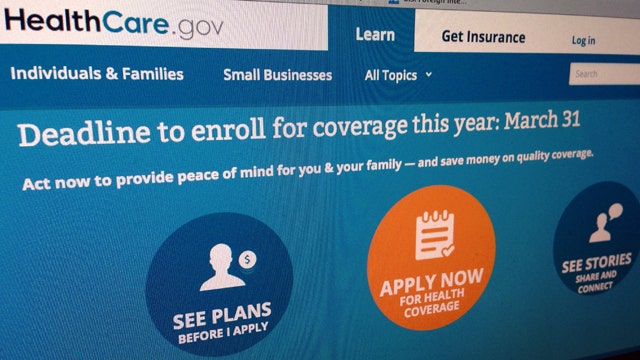WH extends ObamaCare enrollment deadline: Does it matter?
Fair and balanced debate on political fallout of some Americans being granted extra time
Senate Majority Leader Harry Reid tried to explain the Obama administration's latest decision to extend a key ObamaCare deadline by saying people just "are not educated on how to use the Internet."
The explanation, which glossed over the myriad technical problems HealthCare.gov had for weeks after its October launch, came as the administration faced Republican criticism for a late-breaking decision to extend a looming deadline for some. Open enrollment in the Affordable Care Act federal exchanges is set to end March 31, but the Department of Health and Human Services will let those who start the application process before that date have a bit more time to finish.
Reid, and the Obama administration, will not call the change a "delay."
"We have hundreds of thousands of people who tried to sign up and they didn't get through," Reid said during a press conference, before describing the difficulties people have with the Internet in general.
"There are some people who are not like my grandchildren who can handle everything so easily on the Internet, and these people need a little extra time. ... The example they gave us is a 63-year-old woman came into the store and said, 'I almost got it. Every time I just about got there, it would cut me off.' We have a lot of people just like this through no fault of the Internet, but [because] people are not educated on how to use the Internet," he said.
The administration has fixed many of the major issues with HealthCare.gov since its disastrous launch. But it continues to lag behind its enrollment goals. Giving people more time to sign up could boost those enrollment numbers.
Officials made clear, though, that they will rely on the honor system with this extension. Those who come to the site after April 1 will have to attest that they were in line before that date.
House Speaker John Boehner said Wednesday that the move has rendered another ObamaCare deadline "meaningless."
"The administration is now resorting to an honor system to enforce it. What the hell is this, a joke?" Boehner said Wednesday.
"The administration has now handed out so many waivers, special favors and exemptions to help Democrats out politically ... it's basically become the legal equivalent of Swiss cheese," said Senate Minority Leader Mitch McConnell, R-Ky.
The Health and Human Services Department Wednesday posted two documents that outline "special enrollment periods" for broad groups of people trying to access the new online health insurance markets.
Those who've started an application, but weren't able to finish before the March 31 open enrollment deadline, would get a limited amount of time to sign up for coverage that would take effect May 1.
Additionally, people with 10 general categories of "special" circumstances would also get extra time to apply -- up to 60 days. Categories include natural disasters, system errors related to immigration status, computer error messages due to technical difficulties, family situations involving domestic abuse, and other sorts of problems.
"We won't close the door on those who tried to get covered and were not able to do so through no fault of their own," Julie Bataille, communications director for the health care rollout, told reporters.
She deflected repeated questions on whether there is a hard deadline beyond which the administration won't take applications.
Special enrollment periods are allowed under the health law, and standard for workplace insurance. But they are mainly used to accommodate changes in life circumstances.
The administration announcement added to a perception of disarray that has dogged the health care overhaul from its early days. It also raised concerns about the potential for another round of technology problems like the ones that paralyzed HealthCare.gov after its Oct. 1 launch.
How long the extension will last seems to depend on individual circumstances. HHS said it will process paper applications received by April 7. Those applying online may have more time, until April 15, the same as the tax filing deadline. People who are due tax refunds may be willing to put some of that money toward health care premiums.
The Associated Press contributed to this report.






















